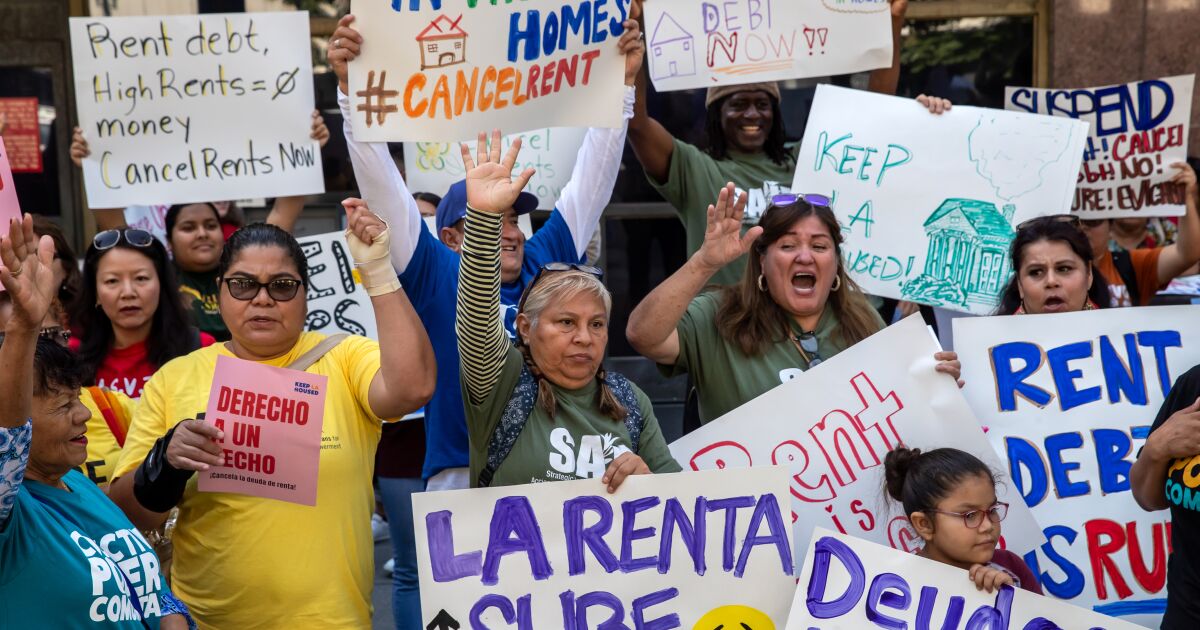
During the first couple of years of the COVID-19 pandemic, Los Angeles tenants were able to skip their rent payments as renters lost their jobs and businesses shut down, but the first deadline for that unpaid rent is Tuesday.
Eviction protections that were in place at the start of the pandemic expired earlier this year, which means that tenants could face evictions if they’re not able to pay their landlords their unpaid rent from the first 19 months of the pandemic by the Aug. 1 repayment deadline.
What does the deadline mean for me?
If you have rental debt accumulated from March 1, 2020, through Sept. 30, 2021, you have to pay that unpaid rent to your landlord, or possibly face eviction.
However, the Los Angeles City Council and Mayor Karen Bass approved a minimum threshold for evictable rent debt, which means that if you owe less than one month of unpaid rent, you can’t be evicted on the basis of late rent, according to a statement by Bass’ office.
The deadline for rent debt owed from Oct. 1, 2021, through Jan. 31, 2023, is Feb. 1, 2024.
Are there any exceptions?
People who owe rent from March 1, 2020, to Aug. 31, 2020, can’t be evicted if they provided their landlord with a form declaring financial hardship due to COVID-19 within 15 days of receiving the form from the landlord.
Also, tenants who provided that same form by the 15-day deadline and paid 25% of their rent owed from Sept. 1, 2020, through Sept. 30, 2021, will also not face eviction.
However, their landlord can pursue action in small claims court for the unpaid rent.
Are there any resources available for me?
Bass said her office is working to prepare resources for people who may be affected by the deadline.
“We will continue to lock arms with our partners to solve this crisis so that everyone in Los Angeles has a safe place to sleep at night and that no one is sleeping on the streets,” Bass said at a news conference Monday.
Her office plans to propose using money from a tax passed last year on the sales of properties over $5 million — known as Measure ULA — to fund rental assistance programs, such as short-term emergency assistance programs, a tenant outreach and education program and a protections from tenant harassment program, Bass said Monday. The plan will come before the City Council’s Housing and Homelessness Committee the day after the deadline.
The Mayor’s Fund for Los Angeles’ program “We Are LA” has also been reaching out to at-risk tenants to help them access legal services and other assistance they may be eligible to receive.
The outreach teams have connected with more than 40,000 people already, according to Bass.
The city will also be reaching out to people who receive eviction notices to help them understand what it means, help them file a response if their landlord filed an unlawful detainer and make sure that they are aware of any resources available to them, Councilmember Nithya Raman, chair of the council’s housing and homelessness committee, said at the conference Monday.
If people receive an eviction notice, they need to respond within five days, Bass’ statement said.
Raman added that the city has partnered with the courts to help make sure that tenants have access to all the resources and services that are available to them, as well as encouraging people to go into mediation or other pathways for alternative resolutions.
Bass’ office along with Raman also recommended tenants reach out to the city’s housing department. Renters can do so by scheduling an appointment at one of the agency’s public counters or calling at (866) 557-7368.
There are also more resources for tenants available on the Tenant Power Toolkit and StayHousedLA website, which can provide information about tenant rights and the eviction process.
At the conference Monday, Bass said there is also help on the way for landlords through rental assistance, which provides money to the landlord for the back rent.
“To address this problem, you need to protect the tenants, but you also need to protect the landlords as well,” she said.
Times staff writer David Zahniser contributed to this report.
